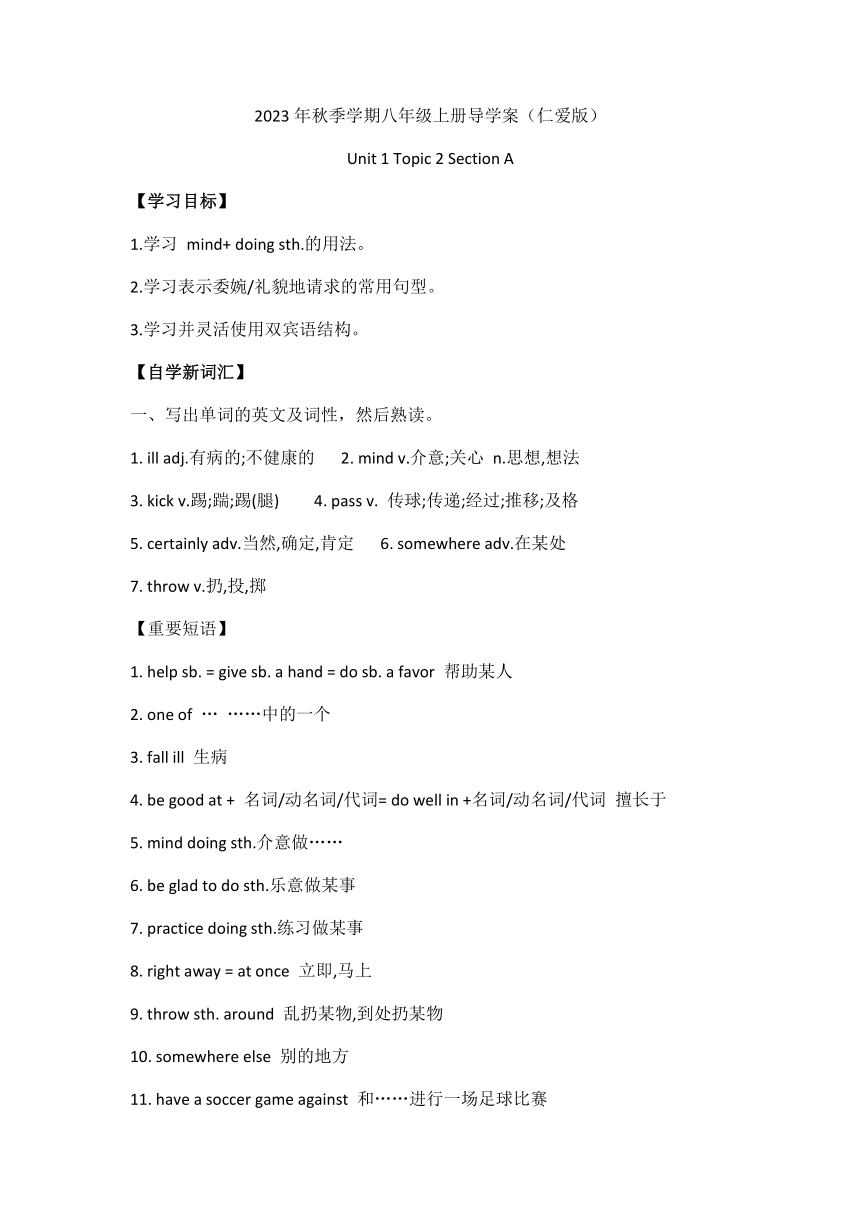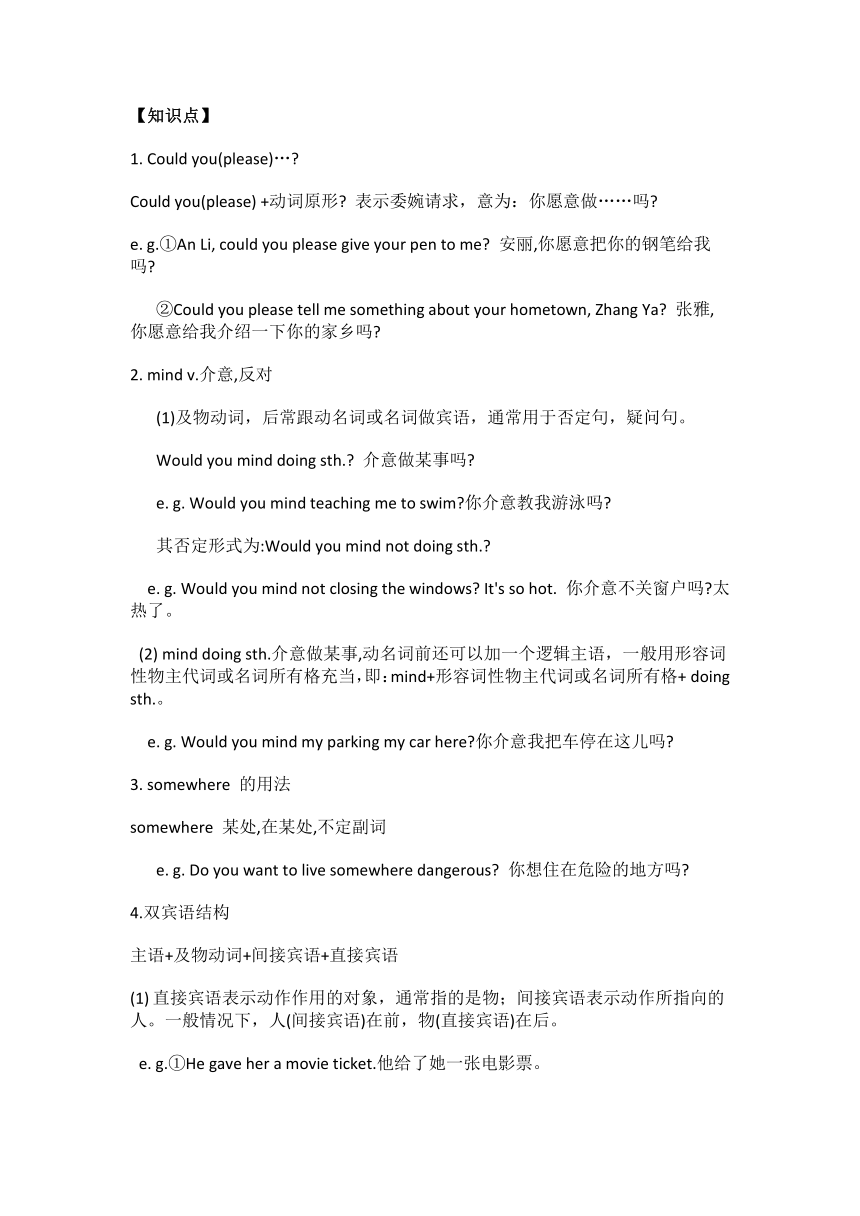仁爱科普版八年级上册Unit 1 Playing Sports Topic 2 Section A 导学案 (含答案)
文档属性
| 名称 | 仁爱科普版八年级上册Unit 1 Playing Sports Topic 2 Section A 导学案 (含答案) |

|
|
| 格式 | docx | ||
| 文件大小 | 19.5KB | ||
| 资源类型 | 教案 | ||
| 版本资源 | 仁爱科普版 | ||
| 科目 | 英语 | ||
| 更新时间 | 2023-09-07 17:53:27 | ||
图片预览


文档简介
2023年秋季学期八年级上册导学案(仁爱版)
Unit 1 Topic 2 Section A
【学习目标】
1.学习 mind+ doing sth.的用法。
2.学习表示委婉/礼貌地请求的常用句型。
3.学习并灵活使用双宾语结构。
【自学新词汇】
写出单词的英文及词性,然后熟读。
1. ill adj.有病的;不健康的 2. mind v.介意;关心 n.思想,想法
3. kick v.踢;踹;踢(腿) 4. pass v. 传球;传递;经过;推移;及格
5. certainly adv.当然,确定,肯定 6. somewhere adv.在某处
7. throw v.扔,投,掷
【重要短语】
1. help sb. = give sb. a hand = do sb. a favor 帮助某人
2. one of … ……中的一个
3. fall ill 生病
4. be good at + 名词/动名词/代词= do well in +名词/动名词/代词 擅长于
5. mind doing sth.介意做……
6. be glad to do sth.乐意做某事
7. practice doing sth.练习做某事
8. right away = at once 立即,马上
9. throw sth. around 乱扔某物,到处扔某物
10. somewhere else 别的地方
11. have a soccer game against 和……进行一场足球比赛
【知识点】
1. Could you(please)…
Could you(please) +动词原形 表示委婉请求,意为:你愿意做……吗
e. g.①An Li, could you please give your pen to me 安丽,你愿意把你的钢笔给我吗
②Could you please tell me something about your hometown, Zhang Ya 张雅,你愿意给我介绍一下你的家乡吗
2. mind v.介意,反对
(1)及物动词,后常跟动名词或名词做宾语,通常用于否定句,疑问句。
Would you mind doing sth. 介意做某事吗
e. g. Would you mind teaching me to swim 你介意教我游泳吗
其否定形式为:Would you mind not doing sth.
e. g. Would you mind not closing the windows It's so hot. 你介意不关窗户吗 太热了。
(2) mind doing sth.介意做某事,动名词前还可以加一个逻辑主语,一般用形容词性物主代词或名词所有格充当,即:mind+形容词性物主代词或名词所有格+ doing sth.。
e. g. Would you mind my parking my car here 你介意我把车停在这儿吗
3. somewhere 的用法
somewhere 某处,在某处,不定副词
e. g. Do you want to live somewhere dangerous 你想住在危险的地方吗
4.双宾语结构
主语+及物动词+间接宾语+直接宾语
直接宾语表示动作作用的对象,通常指的是物;间接宾语表示动作所指向的人。一般情况下,人(间接宾语)在前,物(直接宾语)在后。
e. g.①He gave her a movie ticket.他给了她一张电影票。
②My father bought me a computer. 我爸爸给我买了一台电脑。
如果物(直接宾语)在前,人(间接宾语)在后,则由介词 to,for 等引出人(间接宾语),构成介词间接宾语。
e. g.①He gave a movie ticket to her. 他给了她一张电影票。
②My father bought a computer to me.我爸爸给我买了一台电脑。
(3)如果直接宾语和间接宾语同时使用代词时,必须由介词引出间接宾语。
e. g. My father bought me it.(错误) My father bought it for me.(正确)
show sb. sth./show sth. to sb.buy sb. sth./buy sth. for sb.give sth. to sb./give sb. sth.
pass sb. sth./pass sth. to sb.
【巩固练习】
I.根据句意,用括号内单词的正确形式填空。
1. Her mother ______ (fall) ill yesterday.
2.——Would you mind closing the door, Ann Lee
一 ______(certain) not.
3. ______ (not throw) it like that.
4. Jim is one of the most careful ______ (student).
5. Zhang Jun does well in ______(swim).
6. Would you mind not______ (make) noise here
II.单项选择。
1. Could you please ______ the door for me
A. open B. to open C. opening D. opens
2. They are going to have a basketball game ______ Class Two tomorrow.
A. with B. and C. to D. against
3. I'm very glad______ my old friends.
A. meeting B. meet C. to meet D. meets
4. You pass the ball ______ me like this.
A. for B. at C. to D. on
5. If you keep______ , you will be better and better.
A. trying B. practice C. to do D. giving
III.阅读下面短文,从框内6个选项中选出能分别填入5个小题空白处的最佳选项。
A. Their B. any C. while D. doing E. at F. than
What do students like to do after school Many students like watching TV very much. But from Monday to Friday, they must go to school. So on Saturday and Sunday they stay home and watch TV all day from morning to night. They don't know it's bad for eyes. Usually children like to eat fish, meat and chicken. But they don't like vegetables or fruit. They don't know eating more vegetables and fruit is better eating meat.
At school the children only do a few minutes of exercise or never do exercise. The teachers must know it isn't good for their health.
We always think of ways to keep healthy. We must eat more vegetables and fruit, and do enough sports every day. And we should watch TV and read in right ways. By these, we will have a good body.
参考答案
I.根据句意,用括号内单词的正确形式填空。
1.fell 2. Certainly 3. Don’t throw 4. students 5. swimming 6. making
II.单项选择。
1-5 A D C C A
III.阅读下面短文,从框内6个选项中选出能分别填入5个小题空白处的最佳选项。
1-5 E A F B D
Unit 1 Topic 2 Section A
【学习目标】
1.学习 mind+ doing sth.的用法。
2.学习表示委婉/礼貌地请求的常用句型。
3.学习并灵活使用双宾语结构。
【自学新词汇】
写出单词的英文及词性,然后熟读。
1. ill adj.有病的;不健康的 2. mind v.介意;关心 n.思想,想法
3. kick v.踢;踹;踢(腿) 4. pass v. 传球;传递;经过;推移;及格
5. certainly adv.当然,确定,肯定 6. somewhere adv.在某处
7. throw v.扔,投,掷
【重要短语】
1. help sb. = give sb. a hand = do sb. a favor 帮助某人
2. one of … ……中的一个
3. fall ill 生病
4. be good at + 名词/动名词/代词= do well in +名词/动名词/代词 擅长于
5. mind doing sth.介意做……
6. be glad to do sth.乐意做某事
7. practice doing sth.练习做某事
8. right away = at once 立即,马上
9. throw sth. around 乱扔某物,到处扔某物
10. somewhere else 别的地方
11. have a soccer game against 和……进行一场足球比赛
【知识点】
1. Could you(please)…
Could you(please) +动词原形 表示委婉请求,意为:你愿意做……吗
e. g.①An Li, could you please give your pen to me 安丽,你愿意把你的钢笔给我吗
②Could you please tell me something about your hometown, Zhang Ya 张雅,你愿意给我介绍一下你的家乡吗
2. mind v.介意,反对
(1)及物动词,后常跟动名词或名词做宾语,通常用于否定句,疑问句。
Would you mind doing sth. 介意做某事吗
e. g. Would you mind teaching me to swim 你介意教我游泳吗
其否定形式为:Would you mind not doing sth.
e. g. Would you mind not closing the windows It's so hot. 你介意不关窗户吗 太热了。
(2) mind doing sth.介意做某事,动名词前还可以加一个逻辑主语,一般用形容词性物主代词或名词所有格充当,即:mind+形容词性物主代词或名词所有格+ doing sth.。
e. g. Would you mind my parking my car here 你介意我把车停在这儿吗
3. somewhere 的用法
somewhere 某处,在某处,不定副词
e. g. Do you want to live somewhere dangerous 你想住在危险的地方吗
4.双宾语结构
主语+及物动词+间接宾语+直接宾语
直接宾语表示动作作用的对象,通常指的是物;间接宾语表示动作所指向的人。一般情况下,人(间接宾语)在前,物(直接宾语)在后。
e. g.①He gave her a movie ticket.他给了她一张电影票。
②My father bought me a computer. 我爸爸给我买了一台电脑。
如果物(直接宾语)在前,人(间接宾语)在后,则由介词 to,for 等引出人(间接宾语),构成介词间接宾语。
e. g.①He gave a movie ticket to her. 他给了她一张电影票。
②My father bought a computer to me.我爸爸给我买了一台电脑。
(3)如果直接宾语和间接宾语同时使用代词时,必须由介词引出间接宾语。
e. g. My father bought me it.(错误) My father bought it for me.(正确)
show sb. sth./show sth. to sb.buy sb. sth./buy sth. for sb.give sth. to sb./give sb. sth.
pass sb. sth./pass sth. to sb.
【巩固练习】
I.根据句意,用括号内单词的正确形式填空。
1. Her mother ______ (fall) ill yesterday.
2.——Would you mind closing the door, Ann Lee
一 ______(certain) not.
3. ______ (not throw) it like that.
4. Jim is one of the most careful ______ (student).
5. Zhang Jun does well in ______(swim).
6. Would you mind not______ (make) noise here
II.单项选择。
1. Could you please ______ the door for me
A. open B. to open C. opening D. opens
2. They are going to have a basketball game ______ Class Two tomorrow.
A. with B. and C. to D. against
3. I'm very glad______ my old friends.
A. meeting B. meet C. to meet D. meets
4. You pass the ball ______ me like this.
A. for B. at C. to D. on
5. If you keep______ , you will be better and better.
A. trying B. practice C. to do D. giving
III.阅读下面短文,从框内6个选项中选出能分别填入5个小题空白处的最佳选项。
A. Their B. any C. while D. doing E. at F. than
What do students like to do after school Many students like watching TV very much. But from Monday to Friday, they must go to school. So on Saturday and Sunday they stay home and watch TV all day from morning to night. They don't know it's bad for eyes. Usually children like to eat fish, meat and chicken. But they don't like vegetables or fruit. They don't know eating more vegetables and fruit is better eating meat.
At school the children only do a few minutes of exercise or never do exercise. The teachers must know it isn't good for their health.
We always think of ways to keep healthy. We must eat more vegetables and fruit, and do enough sports every day. And we should watch TV and read in right ways. By these, we will have a good body.
参考答案
I.根据句意,用括号内单词的正确形式填空。
1.fell 2. Certainly 3. Don’t throw 4. students 5. swimming 6. making
II.单项选择。
1-5 A D C C A
III.阅读下面短文,从框内6个选项中选出能分别填入5个小题空白处的最佳选项。
1-5 E A F B D
同课章节目录
- Unit 1 Playing Sports
- Topic 1 I'm going to play basketball.
- Topic 2 I'll kick you the ball again.
- Topic 3 The school sports meet is coming.
- Unit 2 Keeping Healthy
- Topic 1 You should brush your teeth twice a day.
- Topic 2 I must ask him to give up smoking.
- Topic 3 Must we exercise to prevent the flu?
- Unit 3 Our Hobbies
- Topic 1 What's your hobby?
- Topic 2 What sweet music!
- Topic 3 What were you doing at this time yesterday
- Unit 4 Our World
- Topic 1 What's the strongest animal on the farm?
- Topic 2 How can we protect ourselves from the eart
- Topic 3 The Internet makes the world smaller.
